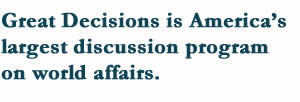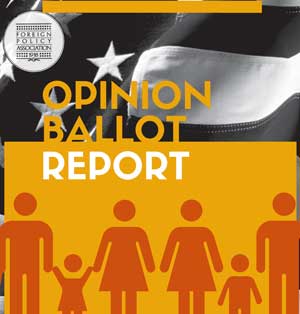Exit from Afghanistan & Iraq
Great Decisions 2012 | Topic 5

What is the return on investment in blood and treasure?
by Michael O'Hanlon
Ten years after September 11, 2001, the U.S. is winding down its military commitment in Iraq and slowly pulling out of Afghanistan. What exit strategy will help Afghanistan and Iraq build stable democratic nations? How can the U.S. continue to achieve its counterterrorism goals? What is the role of the U.S. in the future of the Middle East?
Read a sample from the Briefing Book article
Watch an introduction to the Television Series episode
Take the Spring Quiz for "Exit from Afghanistan & Iraq"
Latest News
Exit from Afghanistan and Iraq Latest News
- Ed Miliband seeks to cap pension drawdown fees - Financial Times
- Pension changes 2015: Annuity or pension drawdown? - BBC News
- Coralville Reservoir to begin drawdown - Iowa City Press Citizen
- GailForce: Threat of Cyber War is Not Hype Part II
- Did US Officials Throw Shakil Afridi to the Dogs?
Related Organizations
-
Center for a New American Security
The Center for a New American Security (CNAS) develops strong, pragmatic and principled national security and defense policies. Building on the deep expertise and broad experience of its staff and advisors, CNAS engages policymakers, experts and the public with innovative fact-based research, ideas and analysis to shape and elevate the national security debate.
-
The Washington Institute for Near East Policy
Founded in 1985, The Washington Institute for Near East Policy was established to advance a balanced and realistic understanding of American interests in the Middle East. Under the guidance of a distinguished and bipartisan Board of Advisors, the Institute seeks to bring scholarship to bear on the making of U.S. policy in this vital region of the world. Drawing on the research of its scholars and the experience of policy practitioners, the Institute promotes an American engagement in the Middle East committed to strengthening alliances, nurturing friendships, and promoting security, peace, prosperity, and democracy for the people of the region.
-
Middle East Institute
Founded in 1946, the Middle East Institute is the oldest Washington-based institution dedicated solely to the study of the Middle East. Its founders, scholar George Camp Keiser and former US Secretary of State Christian Herter, laid out a simple mandate: “to increase knowledge of the Middle East among the citizens of the United States and to promote a better understanding between the people of these two areas.”
Recommended Readings
-
The Black Banners: The Inside Story of 9/11 and the War Against Al Qaeda
by Ali H. Soufan
On September 11, 2001, FBI Special Agent Ali H. Soufan was handed a secret file. Had he received it months earlier—when it was requested—the attacks on New York and Washington could have been prevented. During his time on the front lines, Soufan helped thwart plots around the world and elicited some of the most important confessions from terrorists in the war against al-Qaeda—without laying so much as a hand on them. Most of these stories have never been reported before, and never by anyone with such intimate firsthand knowledge. -
The Longest war: The Enduring Conflict Between America and Al Qaeda
by Peter L. Bergen
Ten years have passed since the shocking attacks on the World Trade Center, and after seven years of conflict, the last U.S. combat troops left Iraq—only to move into Afghanistan, where the ten-year-old fight continues: the war on terror rages with no clear end in sight. In The Longest War Peter Bergen offers a comprehensive history of this war and its evolution, from the strategies devised in the wake of the 9/11 attacks to the fighting in Afghanistan, Pakistan, and beyond. -
The Wars of Afghanistan: Messianic Terrorism, Tribal Conflicts, and the Failures of Great Powers
by Peter Tomsen
As Ambassador and Special Envoy on Afghanistan from 1989 to 1992, Peter Tomsen has had close relationships with Afghan leaders and has dealt with senior Taliban, warlords, and religious leaders involved in the region’s conflicts over the last two decades. Now Tomsen draws on a rich trove of never-before-published material to shed new light on the American involvement in the long and continuing Afghan war.
-
The Good Soldiers
by David Finkel
It was the last-chance moment of the war. In January 2007, President George W. Bush announced a new strategy for Iraq. He called it "the surge." "Many listening tonight will ask why this effort will succeed when previous operations to secure Baghdad did not. Well, here are the differences," he told a skeptical nation. Among those listening were the young, optimistic army infantry soldiers of the 2-16, the battalion nicknamed the Rangers. About to head to a vicious area of Baghdad, they decided the difference would be them. Fifteen months later, the soldiers returned home forever changed. Pulitzer Prize-winning Washington Post reporter David Finkel was with them in Bagdad almost every grueling step of the way.
Great Decisions 2024 cover image.







